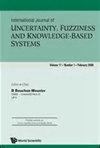不确定复杂双极性偏好环境下的权重确定模型
IF 1
4区 计算机科学
Q4 COMPUTER SCIENCE, ARTIFICIAL INTELLIGENCE
International Journal of Uncertainty Fuzziness and Knowledge-Based Systems
Pub Date : 2023-10-01
DOI:10.1142/s0218488523500332
引用次数: 0
摘要
不确定性在越来越多的实际评估和决策环境中普遍存在。具有不确定性的数值信息或多或少会失去可信度,这使得基于双极性偏好的权重分配方法可以在评价中对不同的信息颗粒赋予不同的重视程度。然而,目前缺乏有效的方法和技术来同时考虑所涉及的各种类型的双极偏好,而不仅仅是排序加权平均聚合可以很好地处理的主要数据的大小。本文提出了可能涉及偏好和不确定评估环境的双极性偏好的类型和类别,讨论了从实际背景中提取偏好强度的一些方法和技术,并提出了几种用于执行基于双极性偏好的信息融合的相应权重向量的技术。给出了详细的决策过程和具有管理背景的数值算例。这项工作还提出了一些实用的方法来应用偏好和不确定性涉及的聚集技术在决策中。本文章由计算机程序翻译,如有差异,请以英文原文为准。
A Weight Determination Model in Uncertain and Complex Bi-Polar Preference Environment
Uncertainties are pervasive in ever-increasing more practical evaluation and decision making environments. Numerical information with uncertainty losses more or less credibility, which makes it possible to use bi-polar preference based weights allocation method to attach differing importance to different information granules in evaluation. However, there lacks effective methodologies and techniques to simultaneously consider various categories of involved bi-polar preferences, not merely the magnitude of main data which ordered weighted averaging aggregation can well handle. This work proposes some types and categories of bi-polar preference possibly involved in preference and uncertain evaluation environment, discusses some methods and techniques to elicit the preference strengths from practical backgrounds, and suggests several techniques to generate corresponding weight vectors for performing bi-polar preference based information fusion. Detailed decision making procedure and numerical example with management background are also presented. This work also presents some practical approaches to apply preferences and uncertainties involved aggregation techniques in decision making.
求助全文
通过发布文献求助,成功后即可免费获取论文全文。
去求助
来源期刊
CiteScore
2.70
自引率
0.00%
发文量
48
审稿时长
13.5 months
期刊介绍:
The International Journal of Uncertainty, Fuzziness and Knowledge-Based Systems is a forum for research on various methodologies for the management of imprecise, vague, uncertain or incomplete information. The aim of the journal is to promote theoretical or methodological works dealing with all kinds of methods to represent and manipulate imperfectly described pieces of knowledge, excluding results on pure mathematics or simple applications of existing theoretical results. It is published bimonthly, with worldwide distribution to researchers, engineers, decision-makers, and educators.

 求助内容:
求助内容: 应助结果提醒方式:
应助结果提醒方式:


